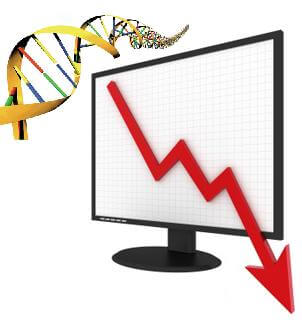
Complete Genomics has had a busy spring. For those of you who missed our February story, or our recent article, CG is a human genome sequencing company that is focusing on economies of scale. In a recent press release seen on BusinessWire this week, CG finally gave some hard facts about their successes. They’ve completed 14 genomes since March, a noteworthy feat considering that just 20 human genomes in the world have ever been published. Complete Genomics is set to dramatically expand its capabilities in the next year, aiming to complete 10,000 genomes by the end of 2010.
I don’t want to do a wholesale endorsement of a company, but Complete Genomics is just way ahead of the curve here. Their pricing of $5000, see the caveat below, is affordable for most institutions. And 10,000 genomes by the end of 2010, are you kidding me? That’s just incredible, and really gives hope that genomic sequencing will become a possibility for research institutions of all sizes. As amazing as CG is, we know of one company that has a real shot of sequencing a genome for just $1,000 in the next 6 months…we will tell you about them as soon as we can.
With scale comes availability, so ten thousand genomes translates to a lot more great scientific research. By comparing the sequences of tumor cells to non-tumor cells, cancer investigators can discover genes that may serve to eliminate the disease while preserving health tissue. Small scale disease studies will likely expand as genome sequencing becomes affordable and we could see a rise of genetically informed therapies for a huge host of illnesses.
According to their release, Complete Genomics’ current client list (more than a dozen) includes: “Pfizer, the Flanders Institute for Biotechnology (VIB), Duke University, Brigham & Women’s Hospital, and the HudsonAlpha Institute for Biotechnology in addition to the previously announced Institute for Systems Biology and Broad Institute of MIT and Harvard.” These institutions are each purchasing five to ten genomes for their disease studies on HIV, schizophrenia, and various cancers (lung, breast, colorectal, melanoma).
Cliff Reid, CEO, has renewed his pledge of 10,000 genomes by end of 2010, and finally revealed some of the intended prices for the sequencing services. For studies of 40 or more genomes, the costs will be around $5000 per. For small studies (8 or more genomes), the costs are considerably higher: $20,000 per. This agrees with my earlier estimate for what current customers are likely paying. It also means that the average citizen will not be able to afford to sequence their own DNA unless they form a co-op of like-minded individuals.
But that may change. Complete Genomics is rapidly expanding their capabilities, and may eventually reach a production rate far above ten thousand genomes per year. That opens the opportunity for cheap individual sequences, or gives hope that an aggregating service (that finds 40+ people who want to sequence and helps them negotiate a group rate) would be easily formed.
The recent press release vaguely outlines how CG hopes to achieve their triumph of scaling. First, they are developing new sequencing instruments to process several high density nanoarrays of DNA (DNBs) at once. These DNBs will contain about 2.85 billion spots of DNA, with 70 bases per spot, allowing an entire genome to be sequenced on one array. This means Complete Genomics will be able to process around one terrabase (10^12 bases) in a single pass! Sequenced information will be stored on massive computing clusters using proprietary software.
As Complete Genomics transitions from their R&D phase to their commercial phase (expect a launch party in January), I’m excited by their commitment to scale. However, I am concerned with the higher than expected price tag. I was really hoping that you and I might be able to afford to sequence ourselves for one to five thousand dollars (and another company may still provide that opportunity). As CG develops its production further, and as competitors ramp up their own capabilities, we can hope that the economies of scale will work in our favor. Having access to your complete genome at an affordable price may be a necessity in the years to come.


